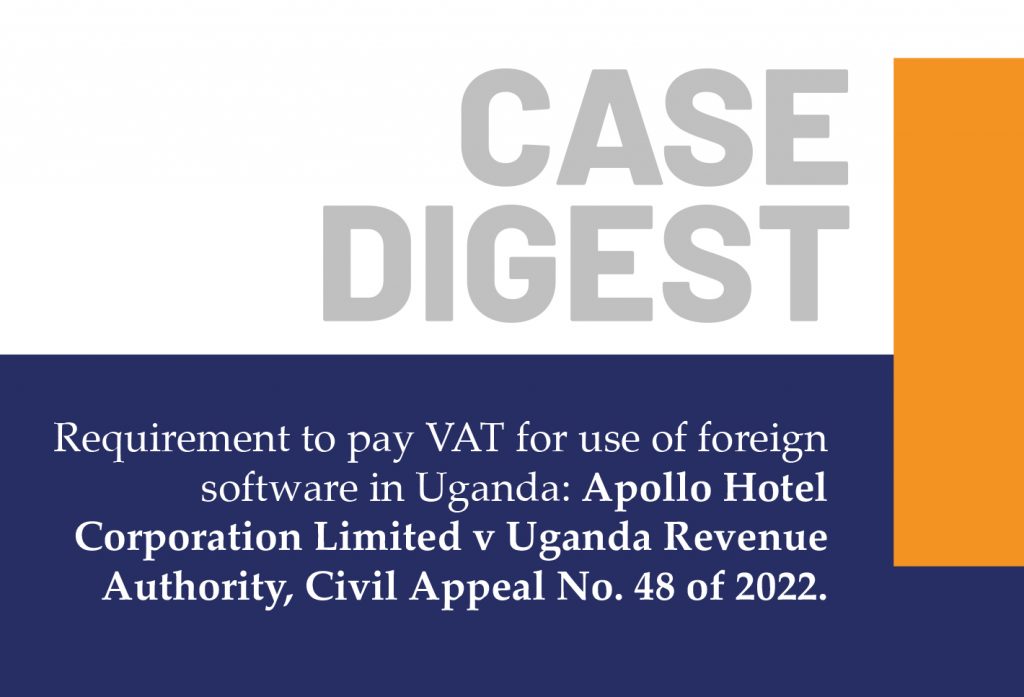Brief facts
Apollo Hotel Corporation Limited (“The Appellant”), operates a hotel in Kampala, Uganda under the name and style “Sheraton Hotel Kampala”. The Appellant entered into an international license agreement with Sheraton International Inc. for the right to brand its hotel with the Sheraton brand and use its marks and related intangible property, and to use Sheraton International Inc.’s centralized reservation system (CRS). Consequently, the Appellant made payments to Sheraton International Inc. upon which the Uganda Revenue Authority (URA) imposed VAT assessment of UGX 398,418,385. The basis of the assessment was the URA treated the CRS as an imported service and hence attracted VAT.
The Appellant applied for Review of the URA’s decision to the Tax Appeals Tribunal vide TAT Application No. 68 of 2018.
The Tribunal found in favour of the URA and held that the use of the trademarked brand name “Sheraton” and the provision of the centralized reservation system amounted to a supply of an imported service. The Appellant being dissatisfied with the decision of the Tribunal appealed to the High Court on the grounds that;
- The Tax Appeals Tribunal erred in law when it held that the Central Reservation System was an imported service.
- The Tax Appeals Tribunal erred in law when it held that the supply of the central reservation system was merely an ancillary service to the principal service namely the right to operate the hotel under the Sheraton brand using the system thereby attracting VAT.
- The right to operate the hotel under the Sheraton brand using the CRS did not amount to an imported service and could, therefore, not attract VAT.
Court’s decision
On the 2nd August, 2023, the High Court dismissed the Appeal and upheld the ruling of the Tax Appeals Tribunal.
Procedural issues:
On the role of the appellate court, it was held that in exercising its appellant jurisdiction the court might interfere with a finding of fact if the court overlooked some material feature in the evidence.
Substantial issues
Justice Thomas Ocaya held that the existence of an agreement for the Appellant to use the Sheraton Brand and the provision of the CRS software for this purpose was sufficient evidence of supply of a service. The court recognised the use of the destination principle and the fact that VAT, under the OECD International VAT/VST Guidelines, in respect to intangibles and business to business transactions is imposed by the jurisdiction in which the customer is located. The court also held that consumption is determined by the location of the consumer. Court went on to note that the taxable point is the receipt of the access and utilization of the software provided by Starwood to the Appellant and not the use of the software to make bookings by third parties outside Uganda. That the Appellant procured the service, consumed it (by utilizing it to receive bookings from third parties) and paid consideration for the same. The court held this was an imported service because the service was utilized by the Appellant in respect of its hotel business in Uganda and was provided by a person not resident of or having a place of business in Uganda.
As to whether CRS was ancillary to the right to operate the hotel under the Sheraton brand, the court held that transactions take the character of the most prominent sub-part. The Court further held that the provision of CRS took the charter of the principal supply being the provision of the license by Sheraton Hotel International. The court came to this conclusion on the basis that there would be no provision of CRS without the broad brand license relationship with Sheraton.
Implications of the decision.
- The decision by the High Court has confirmed the precedent set by the Tax Appeals Tribunal, to wit that, all companies in Uganda which are running businesses using foreign brands by paying franchise fees/licence fees must charge VAT on such payments to those foreign persons.
- The decision equally has significant implications on persons who purchase and rely on software provided from outside Uganda to facilitate their business in Uganda. Such local persons are deemed to be the consumers of the software service and are, therefore, liable to pay VAT on the same, as opposed to the people actually using the software from outside Uganda to book.
- The decision further reinforces the destination principle as stated in the OECD guidelines. Specifically with regard to digital services, the final consumer is the one liable to pay the VAT and not the business which facilitates the consumption.
Conclusion
It is important for business owners to fully understand the destination principle before engaging in the provision or consumption of certain services. This principle requires that services consumed in foreign jurisdictions are considered as exported services while services supplied from a foreign jurisdiction and consumed in one’s own jurisdiction are considered as imported services. The latter attracts VAT on such services while the former does not.




